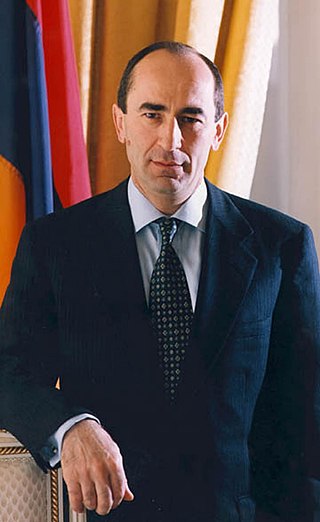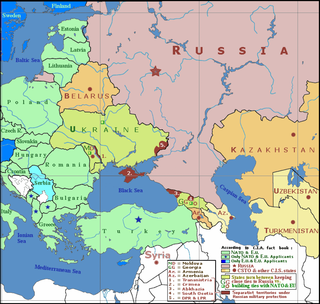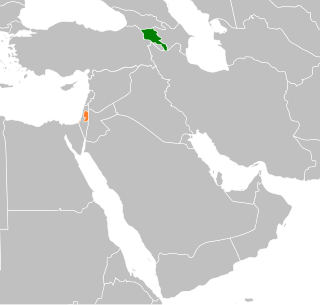
Vazgen Zaveni Sargsyan was an Armenian military commander and politician. He was the first Defence Minister of Armenia from 1991 to 1992 and then from 1995 to 1999. He served as Armenia's Prime Minister from 11 June 1999 until his assassination on 27 October of that year. He rose to prominence during the mass movement for the unification of Nagorno-Karabakh with Armenia in the late 1980s and led Armenian volunteer groups during the early clashes with Azerbaijani forces. Appointed defence minister by President Levon Ter-Petrosyan soon after Armenia's independence from the Soviet Union in late 1991, Sargsyan became the most prominent commander of Armenian forces during the First Nagorno-Karabakh War. In different positions, he regulated the military operations in the war area until 1994, when a ceasefire was reached ending the war with Armenian forces controlling almost all of Nagorno-Karabakh and seven surrounding districts.

Robert Sedraki Kocharyan is an Armenian politician. He served as the President of the Nagorno-Karabakh Republic from 1994 to 1997 and Prime Minister of Nagorno-Karabakh from 1992 to 1994. He served as the second President of Armenia between 1998 and 2008 and as Prime Minister of Armenia from 1997 to 1998.

In international relations, a frozen conflict is a situation in which active armed conflict has been brought to an end, but no peace treaty or other political framework resolves the conflict to the satisfaction of the combatants. Therefore, legally the conflict can start again at any moment, creating an environment of insecurity and instability.

The Nagorno-Karabakh conflict is an ethnic and territorial conflict between Armenia and Azerbaijan over the region of Nagorno-Karabakh, inhabited mostly by ethnic Armenians until 2023, and seven surrounding districts, inhabited mostly by Azerbaijanis until their expulsion during the 1990s. The Nagorno-Karabakh region was entirely claimed by and partially controlled by the breakaway Republic of Artsakh, but was recognized internationally as part of Azerbaijan. Azerbaijan gradually re-established control over Nagorno-Karabakh region and the seven surrounding districts.

Serzh Azati Sargsyan is an Armenian politician who served as the third President of Armenia from 2008 to 2018, and twice as the Prime Minister of Armenia from 2007 to 2008 and again from 17 to 23 April 2018, when he was forced to resign in the 2018 Armenian revolution.

The Community for Democracy and Rights of Nations, also commonly and colloquially known as the Commonwealth of Unrecognized States, rarely as CIS-2, is an international organization in Eastern Europe and the South Caucasus of three breakaway states in the territory of the former Soviet Union, all of which have limited to no recognition from the international community.

The Republic of Artsakh was a republic with limited recognition in the South Caucasus region. The Republic of Artsakh controlled most of the territory of the former Nagorno-Karabakh Autonomous Oblast. It was recognized only by three other non-UN member states, Abkhazia, South Ossetia and Transnistria. The rest of the international community recognized Artsakh as part of Azerbaijan. In November 2012, a member of Uruguay's foreign relations committee stated that his country could recognize Nagorno-Karabakh's independence. In 2012, Armenia and Tuvalu established diplomatic relations, which led to speculation of possible recognition of Artsakh by Tuvalu. In October 2012, the Australian state of New South Wales recognized Nagorno-Karabakh. In September 2014, the Basque Parliament in Spain adopted a motion supporting Artsakh's right to self-determination and in November 2014, the Parliament of Navarre, also in Spain, issued a statement supporting Artsakh's inclusion in taking part in settlement negotiations.

On 17 February 2008, the majority of members of the Assembly of Kosovo, including Hashim Thaçi, and Fatmir Sejdiu, not acting in the capacity of PISG, declared Kosovo an independent and sovereign state. Kosovo was soon recognized as a sovereign state by the United States, Turkey, Albania, Austria, Germany, Italy, France, the United Kingdom, the Republic of China (Taiwan), and others. This triggered an international debate over whether Kosovo's unilateral declaration of independence had set a precedent in international law that could apply to other separatist movements, or whether it is a special case. The recognition of Kosovo's independence by 101 out of 193 UN states, according to many sources, has given fresh impetus to other separatist movements.

Russia's initial recognition of the independence of the Republic of Abkhazia and the Republic of South Ossetia occurred in the aftermath of the conflict in South Ossetia and six months after the western recognition of the unilateral declaration of independence by Serbia's breakaway Republic of Kosovo in February 2008. This, and resultant non-recognition of Abkhazia and South Ossetia by the West, has led to claims of hypocrisy and double standards on the part of both sides of the recognition divide.

Armenia and Serbia maintain diplomatic relations established between Armenia and the Federal Republic of Yugoslavia on 14 January 1993. Both countries are members of the United Nations, Council of Europe, Organization for Security and Co-operation in Europe, NATO's Partnership for Peace, the International Monetary Fund, and the International Bank for Reconstruction and Development.
The NATO Lisbon Summit Declaration was issued on November 20, 2010, by the heads of states and governments, who participated in the 2010 Lisbon summit of the North Atlantic Treaty Organization (NATO). Touching upon various matters, it was described as geared towards pragmatic co-operation on issues of common concern.

The United Liberal National Party, also known by its Armenian initials, is an Armenian national liberal political party established in 2007 and headquartered in Yerevan, Armenia. Co-founder Levon Martirosyan was elected as an MP from the Republican Party of Armenia in 2012.
Kosovo's declaration of independence from Serbia was enacted on Sunday, 17 February 2008 by a unanimous vote of the Assembly of Kosovo. All 11 representatives of the Serb minority boycotted the proceedings. International reaction was mixed, and the global community continues to be divided on the issue of the international recognition of Kosovo. Greece's reaction to the 2008 Kosovo declaration of independence in general is neutral.
Kosovo's declaration of independence from Serbia was enacted on Sunday, 17 February 2008 by a unanimous vote of the Assembly of Kosovo. All 11 representatives of the Serb minority boycotted the proceedings. International reaction was mixed, and the world community continues to be divided on the issue of the international recognition of Kosovo. Ukraine's reaction to the 2008 Kosovo declaration of independence was originally one of neutrality, but it become more strongly opposed to independence during the presidency of Pro-Russian Viktor Yanokovich.

The political status of Nagorno-Karabakh remained unresolved from its declaration of independence on 10 December 1991 to its September 2023 collapse. During Soviet times, it had been an ethnic Armenian autonomous oblast of the Azerbaijan Soviet Socialist Republic. Following the dissolution of the Soviet Union, a conflict arose between local Armenians who sought to have Nagorno-Karabakh join Armenia and local Azerbaijanis who opposed this.
The following lists events that happened during 2014 in Armenia.

The 2016 Nagorno-Karabakh conflict, also known as the Four-Day War, April War, or April clashes, began along the former Nagorno-Karabakh line of contact on 1 April 2016 with the Artsakh Defence Army, backed by the Armenian Armed Forces, on one side and the Azerbaijani Armed Forces on the other.

Georgian–Kosovar relations are foreign relations between Georgia and Kosovo. Formal diplomatic relations between two states are non-existent as Georgia does not recognize Kosovo as a sovereign state.

Armenian-Palestinian relations refers to relations between Armenia and Palestine. Armenia supports Palestinian statehood. Armenia is an observer state of the Arab League in which Palestine is a full member. The former President of Armenia Serzh Sargsyan has stated that Armenia supported the Palestinian people's self determination in an interview with Al Mayadeen. President of Palestine Mahmoud Abbas has also stated that he supported the expansion of Armenia and called Armenians a "great ally of Palestine". On 21 June 2024, the Armenian government recognized the State of Palestine.
















